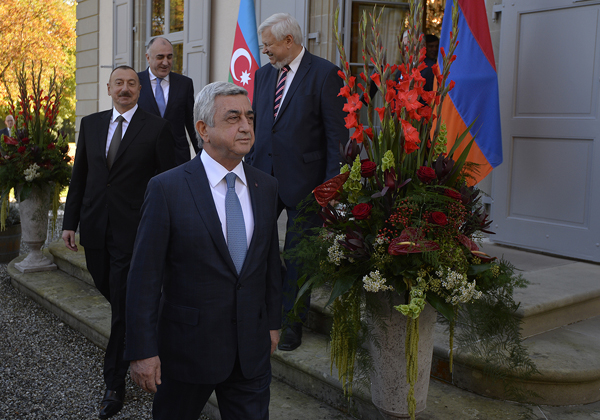Going for negotiations is collapse of own propaganda background formed within numerous years for Aliyev
Why did official Yerevan agree to take part in the Geneva meeting, when it is evident that Aliyev does not implement the arrangements reached during the post-war Vienna and St. Petersburg meetings last year, on introducing mechanisms for investigation of border incidents? This question is being voiced today. The answer to this question was given in the statements of the OSCE Minsk Group Co-Chairs, and the Foreign Ministers of Armenia and Azerbaijan spread after the Geneva meeting.
Noting that the meeting of the two presidents was held in a constructive atmosphere, the mediators and also Armenia and Azerbaijan first stated: “The Presidents agreed to take measures to make the negotiation process more intense and take additional steps aimed at reducing the tension on the contact line”.
What does this mean? Official Baku agreed to continue negotiations and take additional steps aimed at reducing tensions on contact line, that is to say it had to take concrete steps to respect the agreements. “As a next step, the Co-Chairs will have working discussions with the Foreign Ministers in the near future”, it was stated in a joint statement issued shortly after Sargsyan-Aliyev meeting.
What happened after the Geneva meeting? At the Armenian Embassy in Geneva, Switzerland, Serzh Sargsyan just opened the brackets at the meeting with representatives of the Armenian community in Switzerland, presenting what they discussed with Aliyev. “We agreed to take measures to further reduce tensions not to have victims in the frontline”.
Moreover, attention should be paid to the fact that official Baku has not denied Serzh Sargsyan so far. The Azerbaijani authorities simply complain of why Serzh Sargsyan publicized the details of the Geneva talks. “A few minutes ago, we finished the meeting with the Azerbaijani president: we have no concrete arrangement about resolution options. But we have agreed to take measures to further reduce the tension so that we do not have losses in the frontline. I must say that both me and the Azerbaijani President are deeply interested in that. I hope he will always hold that opinion. Of course, we both fully understand the complexity of the problem, but the problem is such that there will never be an easy solution to it. But one thing I want everybody to be sure is that there is no solution for us that could somehow undermine Karabakh’s security. The only solution for us is that Karabakh be beyond the borders of Azerbaijan. No Armenian leader can ever adopt such a decision and implement it, and we will do our best for that by developing Armenia and by strengthening our country economically at the same time”, Serzh Sargsyan said during the meeting with the Armenian community.
The first response from Baku was by the Azerbaijani President’s assistant Novruz Mamedov, who complained on Twitter that “it was decided not to make any statement after the Presidents’ meeting, but Sargsyan did not keep his word again”. Armenian Foreign Ministry Spokesman Tigran Balayan gave a quick and tough response to Mammadov, noting, “Baku’s overdue petty bureaucrat again misses opportunity to keep silent and not demonstrate his narrow-mindedness”.
Then Azerbaijani Foreign Minister supplemented Mamedov’s words. Foreign Ministers of Armenia and Azerbaijan will meet in near future, noted Elmar Mammadyarov, adding that the date and place of the meeting have not been determined yet: “The main purpose of the Foreign Ministers’ meeting is to hold clear discussions”. Mammadyarov considered it necessary to touch upon Serzh Sargsyan’s statements following the meeting with the Azerbaijani President in Geneva. “The agreed statement is a joint statement. The entire text was dictated by the presidents. The Armenian President showed irresponsibility by going beyond the frames of the statement”, said Mammadyarov.
In fact, official Baku states that Serzh Sargsyan’s statements on the Geneva talks are entirely true. In other words, no concrete issue has been discussed in this negotiation process, except that official Baku will have to take steps towards the deployment mechanisms for investigating the incidents. Perhaps, the meeting of the Armenian and Azerbaijani Foreign Ministers will be organized in the near future to discuss those issues.
The Geneva meeting was an important step for continuation of the peace talks. Of course, it is not a guarantee that Aliyev will never resort to provocations anymore. Such a guarantee is hard to find. But one thing is obvious: going for negotiations is a collapse of own propaganda background formed within numerous years for Aliyev. To understand this, it’s enough to recall Aliyev’s statements from different tribunes in recent months and his threats directed towards various structures for not respecting the territorial integrity.
Emma GABRIELYAN




















































